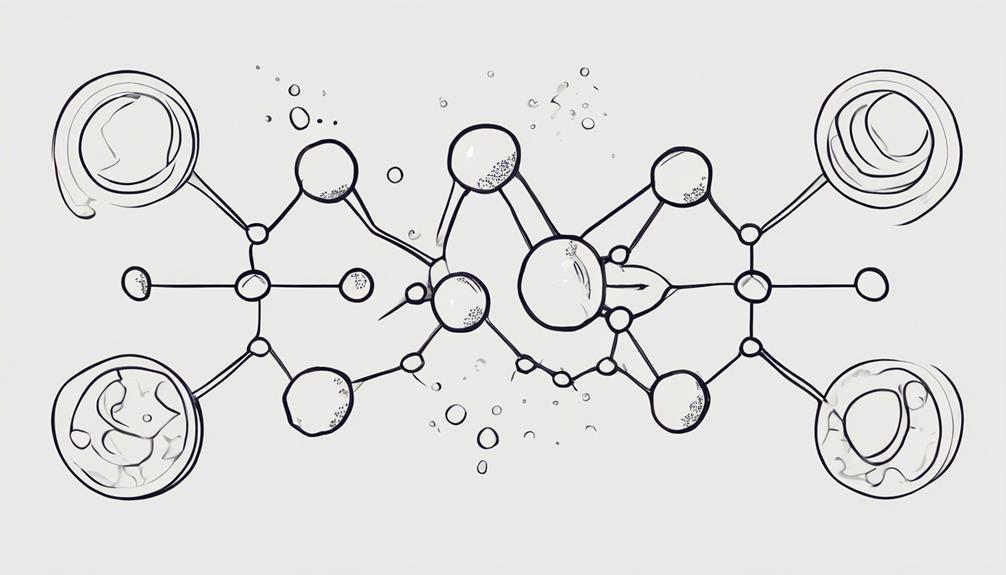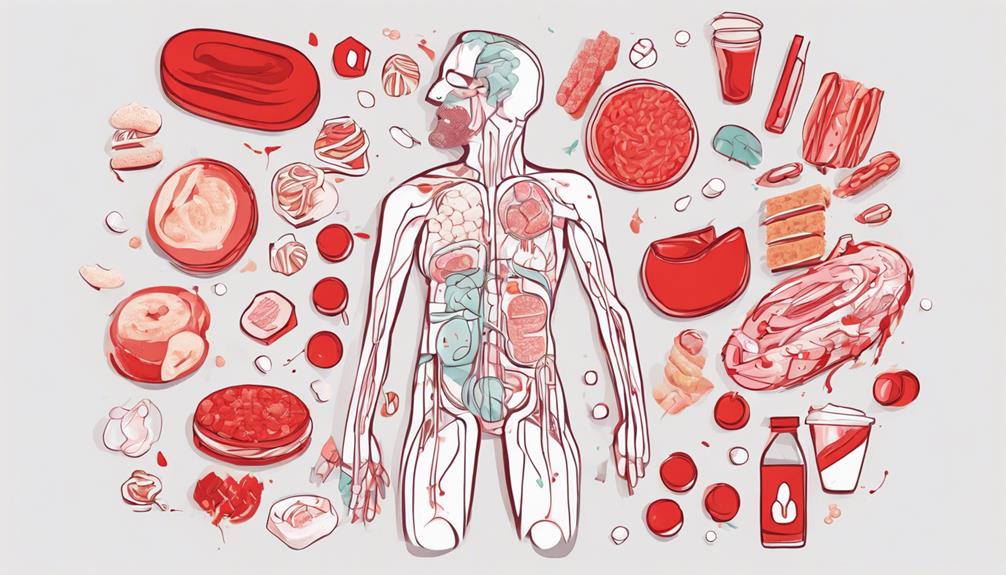Excessive sugar consumption is a prevalent issue in modern diets, posing a significant threat to our overall health and well-being. The impact of sugar on various bodily functions, from heart health to immune function, is profound and often underestimated. By exploring the intricate connections between sugar intake and our physiological systems, we can gain a deeper understanding of why moderation is crucial. As we dissect the layers of sugar's effects on the body, a compelling narrative emerges, urging us to reconsider our dietary choices and prioritize health above momentary indulgence.
Key Takeaways
- Excessive sugar intake harms heart, metabolism, liver, and kidneys, leading to various health risks.
- Sugar consumption affects brain, mood, mental health, and cognitive function negatively.
- High sugar intake contributes to dental problems, skin aging, wrinkles, and premature aging.
- Sugar disrupts hormones, metabolism, and induces inflammation, impacting overall health and well-being.
Sugar's Impact on Heart Health

In the realm of cardiovascular health, the detrimental effects of excessive sugar consumption on the heart are unequivocally significant. High-sugar diets have been closely linked to an increased risk of heart disease, making it imperative to understand the impact of added sugar on heart health. Consuming excess sugar can lead to a cascade of negative consequences, including elevated blood pressure, heightened inflammation, and a higher likelihood of experiencing adverse cardiovascular events like heart attacks and strokes.
One of the key mechanisms through which sugar contributes to heart disease is by promoting chronic inflammation in the body. Chronic inflammation plays a central role in the development and progression of various cardiovascular conditions. Excessive sugar intake can trigger inflammatory pathways, setting off a chain reaction that ultimately undermines heart health. By overloading the liver and promoting insulin resistance, added sugar not only fuels inflammation but also paves the way for conditions like fatty liver disease, further escalating the risk of heart-related complications. Therefore, limiting added sugar intake is paramount in safeguarding heart health and reducing the burden of cardiovascular diseases.
Sugar's Connection to Weight Gain
Excessive sugar consumption poses a significant risk for weight gain due to its high calorie content devoid of essential nutrients. The link between sugar and obesity is well-established, with surplus sugar intake contributing to increased fat storage and metabolic disturbances. By understanding the connection between sugar and weight gain, individuals can make informed choices to better manage their weight and reduce the likelihood of obesity-related complications.
Weight Gain Risk
Linked directly to weight gain, sugar's high calorie content poses a significant risk to one's body composition and overall health. Excessive sugar consumption can lead to the accumulation of body fat as sugar is easily converted into fat by the body. This excess body fat can contribute to obesity, especially around the abdominal area, increasing health risks. Moreover, high sugar intake can disrupt the body's natural hunger and fullness signals, potentially leading to overeating and further weight gain. Consuming too much sugar creates a positive energy balance in the body, where unused energy is stored as fat, exacerbating the risk of weight gain. Therefore, being mindful of sugar intake is crucial in managing weight and promoting better overall health.
Sugar and Obesity
Sugar's correlation with obesity is a well-established concern in the realm of nutrition and health. The consumption of sugar-laden beverages and foods high in added sugars significantly contributes to weight gain by promoting fat accumulation, particularly around the abdominal area. Excessive sugar intake can disrupt the body's metabolic processes, leading to gradual weight gain over time. This weight gain not only poses a risk for obesity but also increases the likelihood of developing obesity-related health conditions. It is essential to cut back on sugar to effectively manage weight and reduce the associated health risks.
| Sugar's Impact on Weight Gain |
|---|
| Excessive sugar consumption contributes to weight gain |
| Sugar-laden beverages and foods high in added sugars promote fat accumulation |
| Sugar disrupts metabolic processes, leading to gradual weight gain |
| Weight gain increases the risk of obesity and related health conditions |
| Cutting back on sugar is crucial for weight management and health |
Metabolic Impact
One's metabolic function can be significantly impacted by the consumption of high amounts of sugar, leading to weight gain and other associated health implications. Excessive sugar consumption provides empty calories that lack essential nutrients, disrupting metabolic processes and promoting fat storage. The liver can become overwhelmed by high sugar intake, converting the excess sugar into fat and contributing to increased body mass. Moreover, sugar spikes insulin levels, which in turn promote fat accumulation and hinder weight loss efforts. Consistent high sugar intake over time can lead to obesity and various related health issues. Understanding the metabolic impact of sugar consumption is crucial in managing weight and overall health.
Sugar's Effect on Liver Function
Excessive sugar consumption poses a significant threat to liver health, with high fructose levels being particularly detrimental. This can lead to fat accumulation, liver inflammation, and the development of fatty liver disease. Understanding the impact of sugar on liver function is crucial for making informed decisions about dietary choices and overall health maintenance.
Liver Health Impact
The impact of high fructose intake on liver health is significant, with links to fatty liver and nonalcoholic fatty liver disease (NAFLD) characterized by liver inflammation and fat accumulation.
- Excessive fructose consumption contributes to the development of fatty liver, a condition where fat accumulates in the liver cells.
- Liver inflammation is a common consequence of high fructose intake, further exacerbating liver health issues.
- Consuming sugar-sweetened beverages heightens the risk of NAFLD due to the increased fat deposition in the liver.
- Research in mice fed a high-fructose diet demonstrated not only liver inflammation but also the development of tumors and fatty liver disease.
Sugar and Metabolism
Sugar's impact on liver function extends beyond mere taste indulgence, significantly influencing metabolic processes and potentially leading to detrimental health outcomes. Excess sugar consumption, particularly fructose from added sugars, can overwhelm the liver's capacity, leading to fat accumulation and potentially causing fatty liver disease. This disruption in liver function not only contributes to metabolic dysfunction but also increases the risk of insulin resistance. A balanced diet low in sugar is crucial for maintaining optimal liver health and supporting proper metabolic function. Below is a table summarizing the key points regarding sugar's effect on the liver:
| Keyword | Description |
|---|---|
| Metabolism | Excess sugar can disrupt normal metabolic processes in the liver. |
| Liver | Sugar overload can lead to fat accumulation in the liver and impact its function. |
| Fructose | The liver metabolizes fructose from sugars, potentially contributing to fatty liver disease. |
| Fatty Liver Disease | High sugar intake can lead to fatty liver disease due to the conversion of sugars into fat in the liver. |
Sugar's Influence on Pancreatic Health

Constant overconsumption of sugar poses a significant threat to pancreatic health due to its impact on insulin regulation and potential development of dysfunction. The pancreas plays a crucial role in regulating blood sugar levels by producing insulin. Here's how chronic high sugar intake affects pancreatic health:
- Increased Insulin Production: Excessive sugar consumption can strain the pancreas, leading to increased insulin production to manage the elevated blood sugar levels.
- Risk of Dysfunction: High sugar intake is associated with an increased risk of pancreatic dysfunction and insulin resistance, potentially disrupting the organ's normal functioning.
- Overworked Pancreas: Over time, the pancreas may become overworked due to the constant spikes in blood sugar levels resulting from consuming too much sugar.
- Higher Likelihood of Issues: Chronic high sugar intake is linked to a higher likelihood of developing pancreatic issues and diabetes, highlighting the importance of moderating sugar consumption to maintain pancreatic health and reduce the risk of associated complications.
Sugar's Role in Kidney Function
Excessive sugar consumption has been linked to detrimental effects on kidney function, including inflammation and oxidative stress that can contribute to kidney disease. The impact of sugar on the kidneys extends to filtration processes, potentially leading to conditions like proteinuria and insulin resistance, which can compromise overall kidney health. Understanding the role of sugar in kidney function is essential for preventing kidney disease and maintaining optimal renal health.
Sugar and Kidney Health
A comprehensive understanding of the impact of sugar on kidney health necessitates an exploration of its role in kidney function.
- Inflammation: High sugar intake can lead to inflammation and oxidative stress in the kidneys, contributing to the development of kidney disease.
- Kidney Stones: Excessive sugar consumption is linked to an increased risk of kidney stones due to alterations in urine composition and kidney function.
- Insulin Resistance: Sugar consumption may result in insulin resistance, negatively affecting kidney health and potentially causing kidney damage over time.
- Renal Function: Consuming excessive sugar can elevate blood pressure and raise the likelihood of chronic kidney disease by impacting renal function.
Managing sugar intake is crucial in preventing kidney issues and preserving overall kidney health.
Impact on Filtration
Exploring the intricate relationship between sugar consumption and kidney filtration reveals critical insights into the impact of sugar on overall kidney function and health. Excessive sugar intake can have detrimental effects on kidney filtration, potentially leading to conditions such as kidney disease, kidney stones, and kidney damage. The inflammatory response triggered by high sugar consumption can impair the kidneys' ability to properly filter waste from the blood. Moreover, elevated blood sugar levels resulting from excessive sugar intake pose a significant risk factor for developing diabetic kidney disease over time. To maintain optimal kidney function and prevent complications, it is essential to limit sugar intake and prioritize a balanced diet that supports kidney health.
Preventing Kidney Disease
In the context of kidney health, understanding the impact of sugar intake on kidney function is crucial for preventing kidney disease. Excessive sugar consumption can lead to kidney inflammation, impair kidney function, and contribute to the development and progression of kidney disease. To protect kidney health and prevent kidney-related complications, managing sugar intake is essential. Limiting added sugars in the diet can help reduce the risk of kidney disease and support overall kidney function.
- High sugar intake is associated with an increased risk of kidney disease and kidney damage.
- Excessive sugar consumption can lead to kidney inflammation and impaired kidney function.
- Sugar consumption may contribute to the development and progression of kidney disease.
- Managing sugar intake is crucial for protecting kidney health and preventing kidney-related complications.
Sugar's Impact on Brain Health
Excessive sugar consumption has been linked to a variety of detrimental effects on brain health, including cognitive decline, impaired memory, and heightened risks of depression and anxiety. High sugar intake can lead to a range of negative outcomes, impacting both mental and emotional well-being. One significant factor contributing to these effects is the way sugar interacts with the brain's reward system. Sugar triggers the release of dopamine, a neurotransmitter associated with pleasure and reward, leading to addictive behaviors similar to those seen with substances like drugs and alcohol. This can result in a cycle of cravings and consumption that can be challenging to break. Furthermore, consuming too much sugar can impair learning and focus abilities, affecting cognitive function. Fluctuations in mood and energy levels caused by sugar can also have a significant impact on overall brain health. The table below highlights the key detriments of excessive sugar consumption on brain health:
| Detrimental Effects | Examples |
|---|---|
| Cognitive Decline | Impaired learning abilities |
| Memory Issues | Forgetfulness |
| Heightened Anxiety | Increased risk of depression |
Sugar's Effect on Mood

Sugar consumption significantly impacts mood regulation by causing blood sugar fluctuations and disrupting neurotransmitter function in the brain. This can lead to various effects on mental well-being, including mood swings, irritability, and an increased risk of depression. Here are four key points to consider regarding sugar's effect on mood:
- Blood Sugar Swings: Excessive sugar intake can result in rapid spikes and subsequent crashes in blood sugar levels, leading to mood swings and irritability.
- Neurotransmitter Disruption: High sugar consumption may interfere with neurotransmitter activity in the brain, affecting mood regulation and potentially contributing to feelings of anxiety and depression.
- Risk of Depression: Studies suggest a correlation between high sugar intake and an elevated risk of developing depression, highlighting the importance of dietary choices in mental health.
- Addictive Behaviors: Sugar-rich foods can trigger addictive behaviors and cravings similar to substances of abuse, impacting mood and overall mental well-being negatively. Managing sugar intake can help maintain a more stable mood and reduce the risk of mood-related disorders.
Sugar's Contribution to Dental Issues
Considering the profound impact of sugar consumption on mood regulation, it is imperative to explore its significant contribution to dental issues as well. Sugar, when consumed in excess, poses a serious threat to dental health. The link between sugar and dental problems lies in the ability of bacteria in the mouth to feed on sugar remnants, leading to the production of acid. This acid, in turn, attacks the tooth enamel, causing erosion and weakening the tooth structure. The continuous cycle of sugar consumption and bacterial activity can eventually result in tooth decay and the formation of cavities.
Maintaining good oral hygiene is essential in combating the detrimental effects of sugar on dental health. Limiting sugary food and drink intake, along with regular brushing and flossing, can help prevent the development of dental issues associated with sugar consumption. By understanding the role of sugar in promoting bacterial growth, acid production, and ultimately tooth decay, individuals can make informed choices to safeguard their dental well-being. Prioritizing dental health through conscious sugar consumption is key to preserving a healthy smile for years to come.
Sugar's Effect on Joint Health

The impact of sugar consumption on joint health is a significant concern that warrants careful consideration and awareness. Excessive sugar intake can exacerbate joint pain and inflammation, leading to discomfort and reduced mobility. Moreover, studies suggest that a high sugar diet may elevate the risk of developing conditions such as rheumatoid arthritis, a chronic inflammatory disorder affecting the joints. Here are important points to note regarding sugar's effect on joint health:
- Increased Inflammation: High sugar intake is linked to increased inflammation in the body, which can worsen joint conditions and contribute to overall joint health deterioration.
- Aggravation of Joint Pain: Sugar consumption can aggravate joint pain, making it essential to monitor sugar intake for individuals experiencing joint discomfort.
- Rheumatoid Arthritis Risk: Excessive sugar consumption may heighten the chances of developing rheumatoid arthritis, emphasizing the need to manage sugar intake for joint health.
- Alleviation Through Diet: Cutting back on sugar has shown promise in alleviating joint pain and improving overall joint health, highlighting the importance of dietary modifications in managing joint conditions.
Sugar's Influence on Skin Health
The impact of sugar on skin health is profound, with excessive consumption accelerating the aging process through the formation of AGEs that harm vital skin proteins. High-glycemic foods exacerbate wrinkles and contribute to premature aging by increasing the production of AGEs, which lead to sagging skin. Understanding the correlation between sugar intake and skin changes underscores the critical need to reduce sugar consumption to maintain skin elasticity and stave off premature aging.
Skin and Sugar Correlation
Indisputably, the correlation between sugar consumption and skin health reveals a critical aspect of aging and skin quality.
- High-glycemic and sugary foods can speed up skin aging processes, leading to the development of wrinkles and skin sagging.
- Poor dietary choices, especially those rich in sugar, can exacerbate skin aging, manifesting visible premature aging signs.
- Advanced glycation end products (AGEs) resulting from sugar-protein interactions have the potential to harm collagen and elastin, crucial for skin elasticity.
- Consumption of sugary foods promotes the production of AGEs, which in turn accelerates the aging trajectory and impairs the overall quality of the skin.
Understanding the intricate relationship between sugar intake and skin changes necessitates further exploration to grasp the complete impact on skin health.
Effects of Sugar
Sugar's impact on skin health is a subject of growing importance in understanding the dynamics of aging and skin quality. High-glycemic foods and sugary foods can accelerate skin aging by contributing to wrinkles, skin sagging, and skin conditions. Advanced glycation end products (AGEs) formed from sugar-protein reactions damage collagen and elastin, leading to skin laxity. The production of AGEs increases with sugary food consumption, which accelerates skin aging. This relationship between sugar intake and skin changes necessitates further research to comprehend its full impact on skin health. Understanding how sugar affects the skin can serve as a catalyst for making informed dietary choices to maintain skin health and quality, ultimately influencing overall well-being.
Sugar's Link to Hormonal Health

Excessive consumption of sugar disrupts the delicate balance of hormones in the body, potentially leading to a cascade of adverse effects on hormonal health. Here are four key ways in which sugar impacts hormonal balance:
- Insulin Resistance: High sugar intake can lead to insulin resistance, where cells become less responsive to insulin. This disrupts glucose metabolism and can result in hormonal imbalances.
- Elevated Cortisol Levels: Sugar spikes can increase cortisol levels, the primary stress hormone. Elevated cortisol levels not only contribute to stress but also disrupt hormonal harmony in the body.
- Thyroid Function: Sugar spikes can affect thyroid function, influencing metabolism and hormone production. Imbalanced thyroid function can further exacerbate hormonal disruptions.
- Inflammation: Consuming too much sugar can lead to inflammation in the body. Chronic inflammation disrupts hormonal health and function, creating an environment conducive to the development of hormonal disorders.
Understanding the intricate relationship between sugar consumption and hormonal balance is crucial for maintaining overall health and well-being.
Sugar's Impact on Metabolism
A high intake of sugar can significantly impact the body's metabolic processes, potentially leading to various health complications. Excessive sugar consumption is closely linked to insulin resistance, a condition that can pave the way for the development of type 2 diabetes. This resistance to insulin's actions disrupts the normal metabolic balance, affecting how the body utilizes glucose and stores fat. Consequently, weight gain and obesity can become prevalent outcomes of prolonged high sugar intake.
Moreover, the disruption caused by high sugar consumption extends to blood sugar levels, contributing to erratic fluctuations that can disturb energy levels and overall metabolic function. The body's ability to efficiently burn calories is impeded by excessive sugar intake, potentially resulting in metabolic dysfunction. Additionally, the storage of excess fat in the liver due to sugar overload can lead to the development of fatty liver disease, further highlighting the detrimental impact of sugar on metabolism. It is crucial to be mindful of sugar consumption to maintain a healthy metabolic state and overall well-being.
Sugar's Relationship to Inflammation

The impact of sugar consumption extends beyond metabolic disturbances, as it plays a significant role in promoting chronic inflammation within the body. Excessive sugar intake can lead to a cascade of inflammatory responses that affect various systems and organs, increasing the risk of chronic diseases. Here are four key points to consider regarding sugar's relationship to inflammation:
- Link to Chronic Conditions: Inflammation caused by sugar is closely linked to the development of chronic conditions such as heart disease and diabetes.
- Release of Inflammatory Cytokines: High sugar consumption triggers the release of inflammatory cytokines in the body, contributing to sustained inflammation.
- Contribution to Health Issues: Chronic inflammation from sugar can exacerbate conditions like arthritis and metabolic syndrome, further compromising overall health.
- Importance of Limiting Sugar: Limiting sugar intake is crucial in reducing inflammation levels and lowering the risk of inflammatory-related diseases. By moderating sugar consumption, individuals can help mitigate the inflammatory burden on their bodies, promoting better health outcomes in the long term.
Sugar's Role in Immune Function
Understanding the impact of sugar on immune function is essential for maintaining a healthy and robust defense system against infections and illnesses. Excessive sugar consumption has been linked to suppressed immune function, primarily through reducing the activity of white blood cells, which are vital in fighting off pathogens. High sugar intake can also trigger chronic inflammation in the body, weakening its defense mechanisms against infections. Furthermore, sugar hinders the ability of immune cells to effectively destroy bacteria and viruses, making the body more susceptible to illnesses. By compromising the immune system, excessive sugar consumption can impair the body's ability to combat infections and recover from illnesses promptly. Therefore, limiting sugar intake is crucial for supporting optimal immune function and overall health, as it helps prevent the negative consequences associated with impaired immune responses and increased vulnerability to infections.
Sugar's Influence on Long-Term Health

Excessive sugar intake significantly impacts long-term health by contributing to weight gain, inflammation, accelerated aging processes, and various chronic diseases.
- Weight Gain and Obesity: Excessive sugar consumption is linked to weight gain and obesity, which are risk factors for numerous chronic conditions like diabetes and heart disease.
- Inflammation: High sugar intake can lead to chronic inflammation, a key driver of many health issues, including autoimmune diseases, cancer, and cardiovascular problems.
- Accelerated Aging: Long-term consumption of too much sugar can accelerate the aging process, leading to skin problems such as wrinkles and sagging, affecting overall health and well-being.
- Cellular Aging and Liver Health: Sugar influences cellular aging by speeding up telomere shortening and causing energy level fluctuations due to blood sugar spikes. Additionally, consuming excessive sugar is associated with liver health concerns like fatty liver disease and nonalcoholic fatty liver disease, further emphasizing the detrimental effects on long-term health.
Frequently Asked Questions
Why Should You Avoid Too Much Sugar?
Excessive sugar consumption poses significant health risks due to hidden sugars in processed foods, leading to sugar addiction, cravings, and blood sugar spikes. Avoiding too much sugar is essential to prevent weight gain, obesity, insulin resistance, type 2 diabetes, heart disease, and nutrient deficiencies. Opting for sugar alternatives can help reduce these risks, promoting a balanced diet and overall well-being while decreasing the likelihood of various health problems.
What Are the Dangers of Eating Too Much Sugar?
Health consequences of excessive sugar consumption include weight gain, blood sugar spikes leading to energy crashes, and an increased risk of developing chronic conditions like type 2 diabetes and heart disease. Sugar addiction can exacerbate these issues as individuals may struggle to control their intake. Furthermore, high sugar consumption is linked to dental problems such as tooth decay and cavities. Being mindful of sugar intake is crucial for maintaining overall health and well-being.
Why Is It Important to Stop Eating Sugar?
Sugar's impact on health consequences, weight gain, and sugar cravings underscores the importance of halting excessive sugar consumption. Recognizing the addictive nature of sugar and its adverse effects on overall well-being is crucial. By curbing sugar intake, individuals can manage energy levels, reduce the risk of chronic diseases, and foster a balanced diet. Prioritizing sugar reduction can lead to improved health outcomes and promote sustainable lifestyle habits.
What Happens When You Don T Eat Sugar?
When you don't eat sugar, your body may initially experience reduced sugar cravings as it adjusts to lower levels of sweetness. This can lead to more stable energy levels throughout the day and potentially aid in weight loss due to decreased empty calorie intake. Moreover, avoiding sugar can help regulate blood sugar levels, contributing to improved mental clarity. These changes demonstrate the significant impact that sugar reduction can have on various aspects of health and wellbeing.
Conclusion
In conclusion, the detrimental effects of excessive sugar consumption on various aspects of our health are well-documented. By limiting our intake of added sugars, we can mitigate the risks of developing chronic conditions and promote overall well-being. While it may be challenging to break away from sugary foods and beverages due to their addictive nature, making conscious choices to prioritize health can lead to long-term benefits. Embracing a lower-sugar lifestyle is crucial for maintaining optimal health and preventing future health complications.
